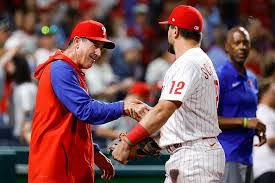In Every Type of Organization, Clear Communication, and Trust Drive Performance
 The less energy you spend trying to figure out what the leader is thinking, or interpreting what’s being said, or not being said; the less you’re preoccupied with whether they trusts you… the more you can focus of producing results.
The less energy you spend trying to figure out what the leader is thinking, or interpreting what’s being said, or not being said; the less you’re preoccupied with whether they trusts you… the more you can focus of producing results.
Case in point… The Philadelphia Phillies, despite one of the most high-powered lineups in the league, have struggled mightily through the months of April and May, falling 12 games out of first place, with a record of 20-27. When you have the kind of hall-of-fame talent the Phillies have in your lineup every day and you’re not producing wins, all eyes point to the leadership. In this case, manager Joe Girardi attracted most of the attention. And it appears for good reason.
In quality organizations like the Phillies, there’s an unspoken rule against finger-pointing or assigning blame. It’s simply not done. Girardi has always backed his players and reasoned away their poor performance, while privately expressing his anger, and becoming distant.
Eventually, at the end of May, Girardi was fired and replaced with one of his internal managers, Rob Thomson. The management switch appears to have triggered the release of something powerful in the Phil’s clubhouse, because they’ve won nine straight games under their new manager, and a completely different energy now permeates the locker room.
Not only have star players, like Harper, Schwarber, and Hoskins caught fire, but their younger players and rookies have also been tearing it up.
While no one is expressly stating that the coaching change itself created the shift, no one is calling it a coincidence, either.
Their new coach, Rob Thomson is a communicator. Not only does he keep his players informed about their playing time… he explains why. While Girardi seemed reluctant to give his younger players playing time, Thomson seems confident in them. He realizes young players need time to develop and trusts them to develop and produce quickly.
As quoted in Alex Coffey’s recent Philadelphia Inquirer article, “[Thomson] is very open,” Moniak said. “He’s very communicative with everybody in the clubhouse. He’ll let you know when you’re playing; he’ll let you know when you’re not playing. Reasonings behind things, stuff like that. There are no secrets with [Thomson], and that’s been huge, especially for the young guys. You can sense the faith he has in us. He trusts us to get the job done, and, so far, we’ve been doing it.”
In any professional field, the difference between high and low performance can come down to some very subtle shifts in behaviors and beliefs.
The quality of the communication between you and your team, and the degree of trust you exhibit in one another can…and will…materially shape the outcomes you produce. Sometimes overnight.